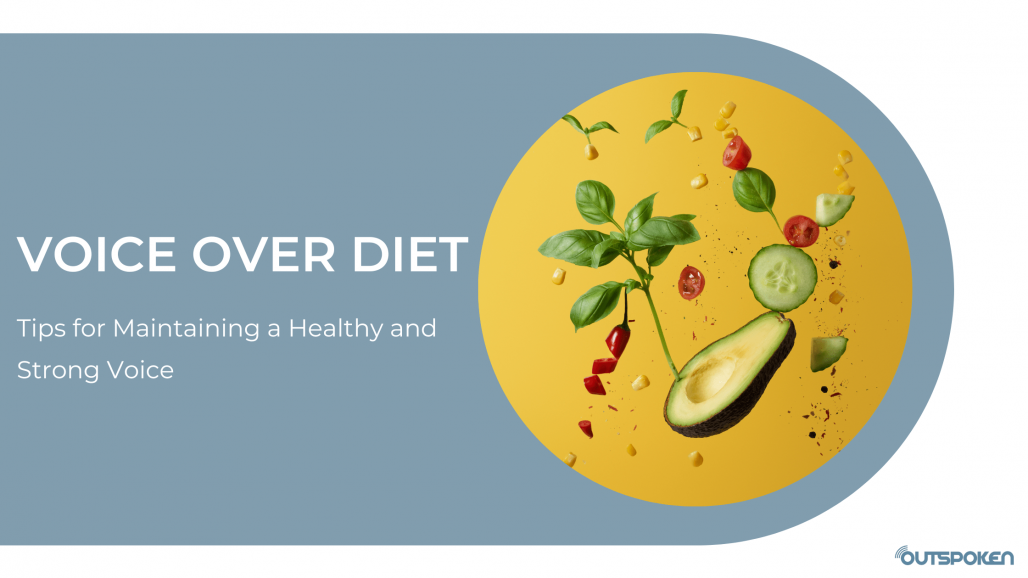Learn what makes a voice sound natural, how to brief voice-over talent effectively, and practical ca...
The Voiceover Diet: Tips for Maintaining a Healthy and Strong Voice

Happy National Nutrition Month everyone! Eating a balanced diet with plenty of fruit, vegetables, and lean proteins can help support your vocal health and ensure that your voice stays strong and clear. As we celebrate this month, let's make a commitment to fuel our bodies with the nutrients we need to perform at our best.
How Does Your Diet Affect Your Vocal Health?
As a professional voice over artist, your voice is your most valuable asset. But did you know that what you eat can have a significant impact on your vocal health? In this article, we'll explore the best and worst foods for your voice, and how they can affect your performance.
The Voice Actor’s Diet: How To Take Care Of Your Voice
First, let's talk about the best foods for your voice. These are the foods that can help keep your vocal cords healthy and your voice strong and clear.
1.Water
Staying hydrated is crucial for vocal health. When your body is dehydrated, your vocal cords can become dry and irritated, making it harder to produce clear, resonant sounds. Aim for at least 8-10 glasses of water per day, and avoid dehydrating beverages like alcohol and caffeine.
2. Fruit and Vegetables
Fruits and vegetables are rich in vitamins and minerals that are essential for vocal health. Leafy greens like spinach and kale are particularly beneficial, as they contain high levels of antioxidants that can protect your vocal cords from damage.
3. Lean Proteins
Protein is important for building and repairing muscle tissue, including the muscles that control your voice. Choose lean protein sources like chicken, fish, and tofu, which are low in fat and won't cause acid reflux or other digestive issues that can affect your voice.
4. Honey
Honey has long been used as a natural remedy for sore throats and vocal issues. Its antibacterial properties can help soothe inflammation and irritation in the throat, making it a great choice for pre-performance or when you're feeling under the weather.
5. Green Tea
Green tea contains compounds called catechins, which have been shown to have anti-inflammatory and antioxidant properties. Drinking green tea regularly can help protect your vocal cords from damage and keep your voice in top shape. Now, let's talk about the worst foods for your voice. These are the foods that can cause inflammation, irritation, and other issues that can affect your vocal performance.
Now, let's talk about the worst foods for your voice. These are the foods that can cause inflammation, irritation, and other issues that can affect your vocal performance.
1. Dairy Products
Dairy products like milk, cheese, and ice cream can cause excess mucus production, which can make it harder to produce clear, resonant sounds. If you're sensitive to dairy, try alternatives like almond or soy milk, and limit your intake of cheese and other dairy products.
2. Spicy Foods
Spicy foods can cause acid reflux and irritation in the throat, which can affect your vocal cords. If you're planning to perform or record, avoid spicy foods for at least a few hours beforehand.
3. Alcohol
Alcohol is dehydrating and can cause inflammation in the throat, making it harder to produce clear, resonant sounds. If you do drink alcohol, be sure to drink plenty of water to stay hydrated.
4. Caffeine
Like alcohol, caffeine is dehydrating and can cause irritation in the throat. If you're a coffee drinker, be sure to balance your caffeine intake with plenty of water.
5. Fried and Fatty Foods
Fried and fatty foods can cause acid reflux and other digestive issues that can affect your vocal cords. If you're prone to acid reflux, try to avoid fried foods and stick to lean proteins and vegetables.
Other Ways Your Can Protect Your Voice
In addition to these dietary considerations, there are a few other things you can do to support your vocal health. These include:
- Resting your voice - Just like any other muscle, your vocal cords need time to rest and recover. If you're feeling hoarse or tired, take a break from speaking or singing and give your voice a chance to recover.
- Practicing good vocal hygiene - This includes things like staying hydrated, avoiding smoking, and shouting or yelling.
- Knowing when to seek professional support - If you're experiencing persistent vocal issues or pain, it's important to seek the help of a professional. A speech therapist or voice coach can help you identify any issues with your technique or vocal habits and provide exercises and techniques to improve your vocal health.
As a professional voice over artist, it's important to take care of your vocal health and protect your most valuable asset. By making smart dietary choices, resting your voice when needed, and seeking professional help when necessary, you can keep your voice strong and clear for years to come.
Newsletter
Stay up to date with news and special offers. Get to know our new actors and features
NEED HELP?
Visit Frequently Asked Questions page or send us a question.











.png)











Shilpa
Its very useful for a voice over artist. Its very important for a voice over artist to take care of his/her voice.
DPN Talent
Your voice is an extension of yourself, and taking care of it is crucial. Thank you for sharing these valuable tips for maintaining a healthy and strong voice, which will not only enhance our communication but also our overall well-being.
Comment